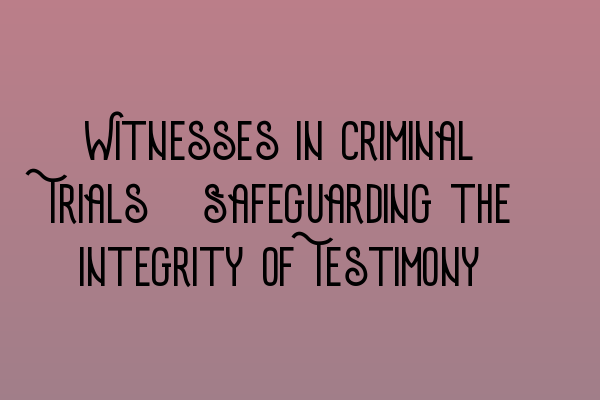Witnesses in Criminal Trials: Safeguarding the Integrity of Testimony
At SQE Criminal Law & Practice Law UK, we understand the crucial role that witnesses play in criminal trials. Their testimony often serves as the cornerstone of a case, and it is imperative to safeguard the integrity of their statements. In this article, we will explore the importance of witnesses, the challenges they face, and the measures necessary to ensure their testimony remains credible.
Why are Witnesses Essential in Criminal Trials?
Witnesses provide firsthand accounts of events and can offer crucial insight into the circumstances surrounding an alleged crime. Their testimony aids in establishing facts, determining guilt or innocence, and upholding the rule of law.
In order to comprehensively understand the significance of witnesses, it is essential to grasp the types and categories of witnesses encountered in criminal trials.
Types of Witnesses
There are several types of witnesses that can be called upon in criminal trials:
- Eyewitnesses: Individuals who have observed the crime firsthand are known as eyewitnesses. Their testimony can be highly influential in proving guilt or establishing an alibi.
- Expert Witnesses: These witnesses possess specialized knowledge or skills in a particular field and are called upon to provide their expert opinion on matters relating to the case.
- Character Witnesses: These witnesses have personal knowledge of the defendant’s character and can provide insight into their reputation, which may impact the jury’s perception.
Challenges Faced by Witnesses
While witnesses are pivotal in criminal trials, they often encounter significant challenges that can impact the integrity of their testimony. These challenges include:
- Fear and Intimidation: Witness intimidation is a major concern, particularly in cases involving organized crime or high-profile defendants. Witnesses may be reluctant to testify due to fear for their safety or that of their loved ones.
- Memory and Perception: Witnesses may struggle to accurately recall events, especially if they occurred under high-stress situations. Additionally, human perception can be influenced by bias, which may affect the accuracy of their testimony.
- Credibility Concerns: The credibility of witnesses can be called into question, particularly if they have a history of dishonesty, bias, or ulterior motives. Cross-examination plays a crucial role in evaluating witness credibility.
Safeguarding the Integrity of Testimony
Ensuring the integrity of witness testimony is essential for a fair and just criminal trial. Here are some measures that can be implemented:
- Witness Protection Programs: Witness protection programs can provide a safe environment for witnesses to testify without fear of retribution. These programs may include relocation, identity changes, and ongoing security measures.
- Evidence Preservation: It is essential to promptly collect and preserve all relevant evidence to prevent tampering or loss of crucial information. This includes video footage, photographs, and audio recordings.
- Cross-Examination and Expert Testimony: Cross-examination allows the defense to challenge the witness’s credibility and test the accuracy of their statements. In complex cases, expert witnesses can provide specialized knowledge to aid the court in understanding the evidence.
Conclusion
Witnesses play a critical role in criminal trials, and safeguarding the integrity of witness testimony is paramount. By addressing the challenges witnesses face and implementing measures to protect them, we can ensure a fair and just criminal justice system.
For further information on SQE exams, preparation courses, and practice materials, please visit our related articles:
